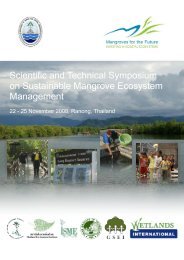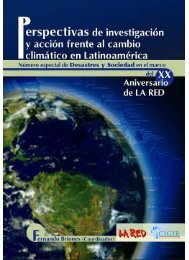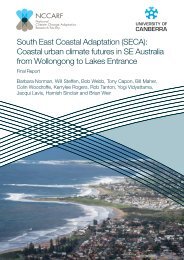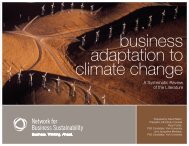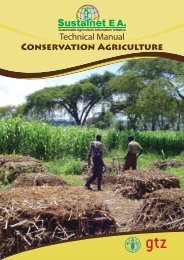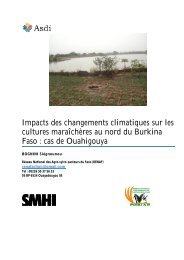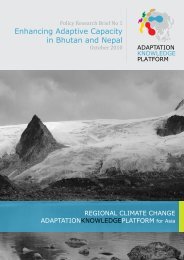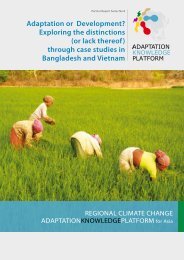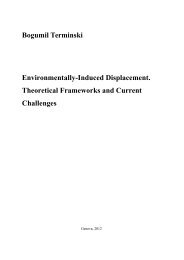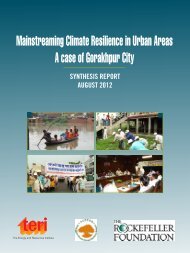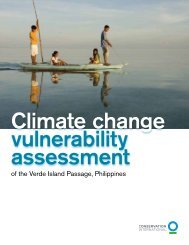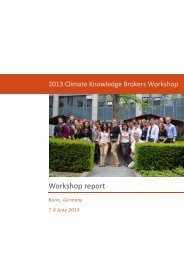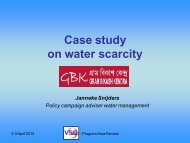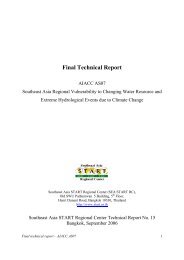that we should just burn everything you know, <strong>and</strong> just keep going I just thinkthat, if we build more resilient localised systems, more diverse systems, the morediverse, the more local, the more resilient, the better. If I have a garden here <strong>and</strong>it gets wiped out by <strong>climate</strong> <strong>change</strong>, my hope is that, there are five or ten gardensin other <strong>urban</strong> areas that will miss that <strong>and</strong> they can plant another crop orwhatever. I mean sure it is nice to eat the <strong>food</strong> that we want to eat, but if it comesdown to a <strong>food</strong> scarcity situation we are going to eat what we are given [microfarmer,Gold Coast].Similarly, a backyard gardener from Melbourne expressed his vision of an exp<strong>and</strong>ingnetwork of <strong>climate</strong>-adapted <strong>and</strong> resilient <strong>food</strong> forests through <strong>urban</strong> backyards, <strong>and</strong>outwards into sub<strong>urban</strong> parks:What I’ve realised is that the next step beyond an individual’s isolated <strong>food</strong> forestis to have many of these linked up. To have a sense of community where peopleshare their produce. They all grow different produce, <strong>and</strong> share it betweenthemselves. That evens out any sort of fluctuations in species, weather, <strong>climate</strong>conditions <strong>and</strong> everything else. It creates a more resilient production system.[Backyard gardener <strong>and</strong> permaculturalist, Melbourne]6 <strong>Urban</strong> agriculture <strong>and</strong> <strong>urban</strong> <strong>resilience</strong>Individual underst<strong>and</strong>ing of <strong>resilience</strong> in the <strong>urban</strong> context was summed up by‘adaptability’, ‘flexibility’, ‘preparedness’, ‘confidence’, <strong>and</strong> ‘increased skills’. Communitygroups spoke of ‘social <strong>resilience</strong>’ <strong>and</strong> ‘connectedness’, expressed through ‘sharing<strong>and</strong> doing’, ‘networking’, ‘re-skilling’ <strong>and</strong> ‘enhancing capabilities’.When you create space for people to come together, amazing things canhappen…Council could encourage neighbours to steward a street… This has realpotential [Not affiliated, Melbourne].A local government officer exp<strong>and</strong>ed:Resilience for me is the ability to decentralise systems – I see <strong>resilience</strong> as anevolution in action, creating opportunities for people to be actively engaging in apractice, growing <strong>food</strong> say, in a very localised sense that allows them to evolvethe most appropriate systems for their particular needs, <strong>and</strong> their particular time.And I think it’s something that needs to be inspired, because people will naturallydo it. I see that as resiliency around <strong>food</strong> – people growing their own <strong>food</strong> locally,in their own neighbourhood, are like little life-rafts, little support networks, that areforming around growing <strong>and</strong> producing <strong>food</strong>; but more importantly, getting out oftheir houses, <strong>and</strong> co-living, sharing the burdens of life in a city, <strong>and</strong> life in general,in a neighbourhood. This is something that I know existed before - it hasn’texisted in my lifetime, or at least in my experience, but it’s something that I seeas true <strong>resilience</strong>. When times become difficult, people, rather than go internally,come out [local government employee, Melbourne].Researchers tended to underst<strong>and</strong> <strong>resilience</strong> from the perspective of social-ecologicalsystems thinking. Brian Lake, research scientist <strong>and</strong> chair of the Resilience Alliance,defines <strong>resilience</strong> in terms of ‘the capacity of a system to undergo <strong>change</strong> <strong>and</strong> still<strong>Urban</strong> <strong>food</strong> <strong>security</strong>, <strong>urban</strong> <strong>resilience</strong> <strong>and</strong> <strong>climate</strong> <strong>change</strong> 131
etain its basic function <strong>and</strong> structure’. A resilient system is seen to include featuressuch as:ecological, social <strong>and</strong> economic diversity;tight feedback loops;working with natural cycles;well-developed social networks <strong>and</strong> leadership, <strong>and</strong> high levels of trust;an emphasis on ‘learning, experimentation, locally-developed rules <strong>and</strong>embracing <strong>change</strong>’;institutions that include redundancy in their governance structures <strong>and</strong> a mixof common <strong>and</strong> private property with overlapping access rights; <strong>and</strong>,consideration of ‘all of nature’s un-priced services – such as carbon storage,water filtration <strong>and</strong> so on – in development proposals <strong>and</strong> assessments.In Melbourne’s <strong>urban</strong> agriculture <strong>and</strong> community <strong>food</strong> movement, there seems to be aview that the current globalised <strong>food</strong> system, because of its heavy dependence onfossil fuel inputs, <strong>and</strong> its high ecological footprint, is fundamentally non-resilient <strong>and</strong>vulnerable to systemic breakdowns or even collapse.A resilient <strong>food</strong> system, on the other h<strong>and</strong>, will, according to most interviewees,have a number of features that will enable it to cope with a variety of external <strong>and</strong>systemic shocks (<strong>climate</strong> <strong>change</strong>, Peak Oil); <strong>and</strong> also be capable of deliveringfairness <strong>and</strong> social justice, for farmers <strong>and</strong> consumers.A resilient <strong>food</strong> system would work from <strong>food</strong> production to consumption, retail<strong>and</strong> waste, <strong>and</strong> how we deal with that. A functioning, coherent system, wouldprovide well for everybody in the population [Manager, NGO].Integrated planning frameworks were also mentioned:A resilient <strong>food</strong> system also means looking at retail <strong>and</strong> <strong>food</strong> service, so theoutlets for <strong>food</strong> are accessible to people, are in the right locations, that they areaffordable <strong>and</strong> provide a good mix of healthy options. It also means including the<strong>food</strong> service industry, which means tackling the whole question of fast <strong>food</strong>outlets [Manager, NGO].<strong>Urban</strong> agriculture is seen by interviewees as having a key role to play in buildinggreater levels of <strong>urban</strong> <strong>resilience</strong> in general <strong>and</strong> <strong>climate</strong> <strong>resilience</strong> in particular. Acommon view is that localisation of <strong>food</strong> systems will be a key adaptation, together witha greater sense of shared <strong>and</strong> collective responsibility for the design of <strong>climate</strong>-ready<strong>urban</strong> <strong>food</strong> systems:Small <strong>and</strong> diverse will be the way to go. Food needs to be close to people; theywill notice its needs <strong>and</strong> respond to it. They will underst<strong>and</strong> the necessaryadaptations that might be required, such as additional shade. There needs to begreater flexibility, greater underst<strong>and</strong>ing of local resources, <strong>and</strong> the taking ofdecisions collectively [<strong>Urban</strong> gardener <strong>and</strong> local <strong>food</strong> advocate].One of the emerging features of community-level <strong>urban</strong> agriculture in recent years hasbeen <strong>food</strong> swaps. A backyard gardener emphasised the essential role that strongcommunity relationships <strong>and</strong> networks have to play in terms of creating a resilient<strong>urban</strong> <strong>food</strong> system:<strong>Urban</strong> <strong>food</strong> <strong>security</strong>, <strong>urban</strong> <strong>resilience</strong> <strong>and</strong> <strong>climate</strong> <strong>change</strong> 132
- Page 1 and 2:
Synthesis and Integrative ResearchF
- Page 3 and 4:
Published by the National Climate C
- Page 5 and 6:
ABSTRACTFood security is increasing
- Page 7 and 8:
1. a review of the literature: on n
- Page 9 and 10:
its Food for All project. This help
- Page 13 and 14:
In response to the existential thre
- Page 15 and 16:
2. OBJECTIVES OF THE RESEARCHFood i
- Page 17 and 18:
debates and to the more systematic
- Page 19 and 20:
organisation in the past few years.
- Page 21 and 22:
4. RESULTSIn this section we presen
- Page 23 and 24:
increasing productivity. Thus, whil
- Page 25 and 26:
people and the origins of their foo
- Page 27 and 28:
urban food supply chains. Thus, whi
- Page 29 and 30:
This logistics system is dominated
- Page 31 and 32:
Like Hodgson et al., as per definit
- Page 33 and 34:
esilient, powerful by being locally
- Page 35 and 36:
volume or even its contribution to
- Page 37:
community food growing can have on
- Page 40 and 41:
generations this history has been f
- Page 42 and 43:
a stronger focus on addressing the
- Page 44 and 45:
The third key aspect is fairness -
- Page 46 and 47:
climate (which we live and work in
- Page 48 and 49:
agriculture. Eight percent is in ur
- Page 50 and 51:
This concept of the ‘spaces in be
- Page 52 and 53:
esearch scientist and chair of the
- Page 54 and 55:
As discussed above, protection of t
- Page 56:
4.2.5 What is the extent and the im
- Page 60 and 61:
no place under the panoply of pract
- Page 62 and 63:
increased, the market dominance of
- Page 64 and 65:
… the residents of S Park called
- Page 66 and 67:
5. CONCLUSIONSThere is growing conc
- Page 68 and 69:
urban resilience. This inevitably c
- Page 70 and 71:
In many respects these contrasting
- Page 72 and 73:
Many interviewees of both standpoin
- Page 74 and 75:
a given area. The rationale for thi
- Page 76 and 77:
mapping the location of sources of
- Page 78 and 79:
Australian food policy debates refl
- Page 80 and 81:
APPENDIX 1: URBAN FOOD SECURITY, UR
- Page 82 and 83:
IntroductionGlobally, and in Austra
- Page 84 and 85:
Review methodsThis stage of the res
- Page 86 and 87:
despite many of the causes of food
- Page 88 and 89:
…by 2050… food production will
- Page 90 and 91: 2. How is food security (in general
- Page 92 and 93: the food security of cities, but no
- Page 94 and 95: While some see the density of devel
- Page 96 and 97: when suppliers, distributors, and c
- Page 98 and 99: a more prominent role in enhancing
- Page 100 and 101: community gardens webpage on the Co
- Page 102 and 103: comprehensive description of the ca
- Page 104 and 105: In both the developed and developin
- Page 106 and 107: Their review notes a significant in
- Page 108 and 109: lines of supply from often rural pl
- Page 110 and 111: 1 IntroductionCities have always be
- Page 112 and 113: Despite some attempts to curb urban
- Page 114 and 115: the Gold Coast remains a city that
- Page 116 and 117: ackyard/community gardenernot affil
- Page 118 and 119: level in local government. VicHealt
- Page 120: Figure 2: Impacts on Municipal Food
- Page 125 and 126: security I recognise that the cost
- Page 127 and 128: United States, he offered the follo
- Page 129 and 130: This vision highlights the multi-fu
- Page 131 and 132: An environmental education centre.
- Page 133 and 134: Melbourne Food ForestA Melbourne ga
- Page 135 and 136: stakeholder consultations, the repo
- Page 137 and 138: can. We sense the changes. The earl
- Page 139: half-desert environments. We’re g
- Page 143 and 144: government; and that trying to get
- Page 145 and 146: the north and the west, where it wo
- Page 147 and 148: Why do people buy so much food that
- Page 149 and 150: urban agriculture (however broadly
- Page 151 and 152: enefits and risks. Before we can co
- Page 153 and 154: Another important and tangible role
- Page 155 and 156: coast without any problems whatsoev
- Page 157 and 158: BIBLIOGRAPHYAECOM (2011) Scoping St
- Page 159 and 160: Burns, C. I., A. (2007). Measuring
- Page 161 and 162: Edwards, F., & Mercer, D. (2010). M
- Page 163 and 164: James, S. O’Neill, P. and Dimeski
- Page 165 and 166: Millar, R., 2012, ‘Government shi
- Page 167 and 168: Saltmarsh, N. M., J; Longhurst, N.
- Page 169 and 170: Walker B., 2008, Resilience Thinkin



